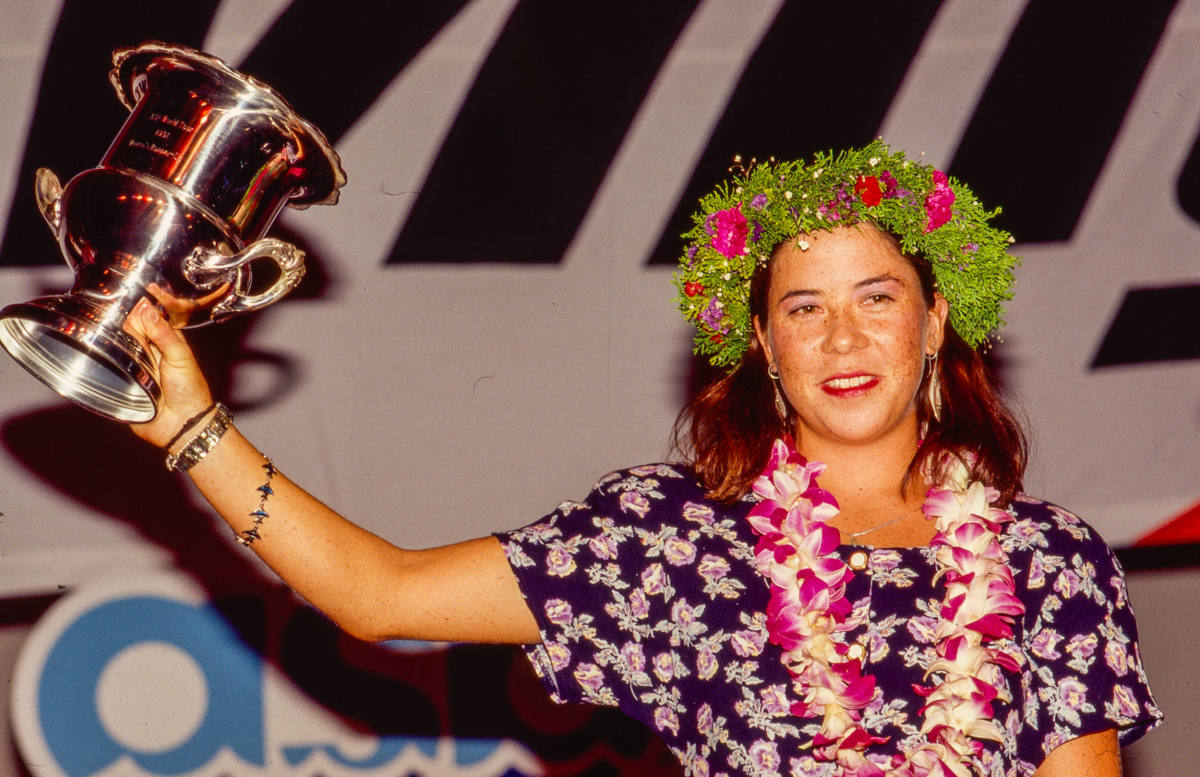
Tom Servais
Pauline Menczer didn’t win a dollar when she claimed her World Title at Sunset in 1993. In fact, she barely got any recognition at all. When the film Girls Can’t Surf was released in 2021, Pauline’s story resonated across the globe and she found herself in a spotlight she’d long been denied. From growing up in Bondi, one of the most hardened suburbs in Australia in the 1980s, to traveling the world on a shoestring budget without sponsorship support, Pauline is now known to have been one of surfing’s toughest and most resourceful competitors.
One of the most famous moments from Pauline’s career was when the women were told to paddle out at JBay when the surf was so small it was breaking on the rocks in 1999. Pauline led the women to a protest by refusing to paddle out, an important signal to the ASP that they wouldn’t stand for that kind of second class treatment. Pauline achieved all that she did while living with rheumatoid arthritis, an autoimmune disease that at times was crippling.
SURFER caught up with Pauline to reflect on her career and hear about the process of writing her book “Surf Like a Woman” with author Luke Benedictus.
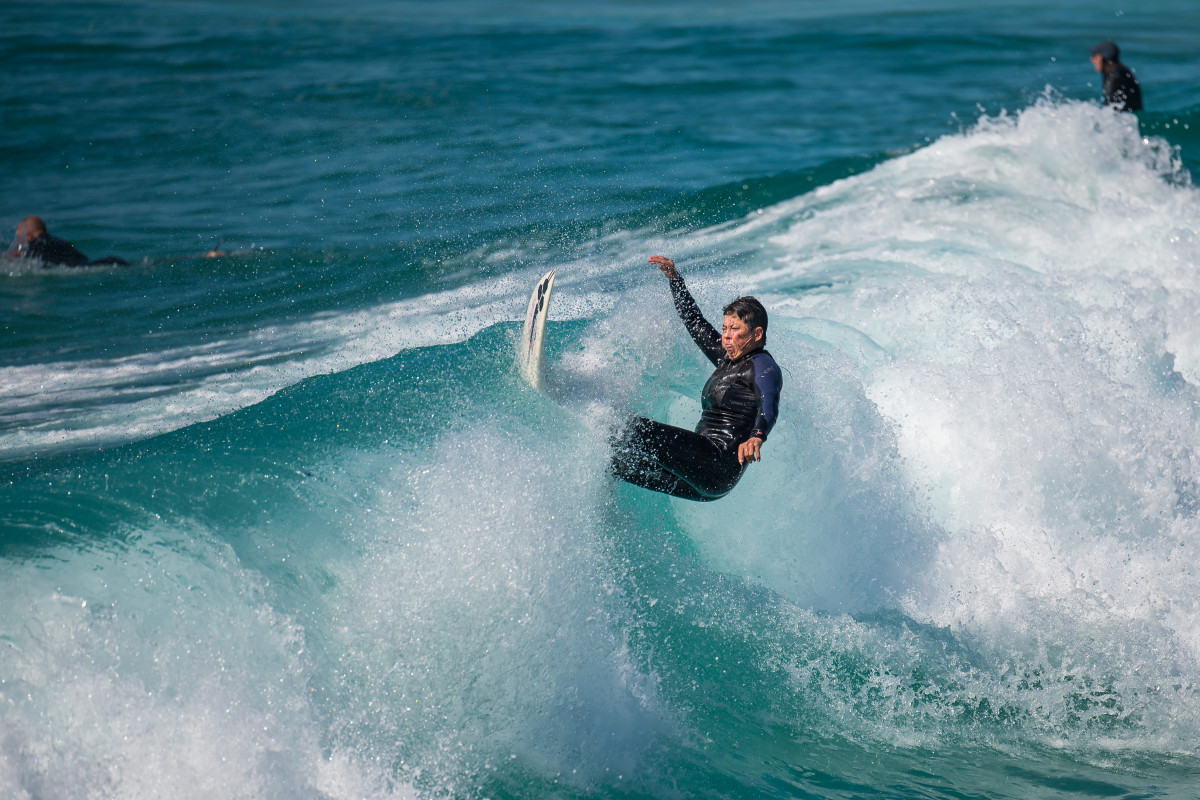
Epic Shotz/Mala Norris
How are you feeling about your book coming out this week?
I’m just ready for it to come out, it feels like it’s been a long time coming. I’m being very ‘warts and all’ in the book. I’ve been so open – it’s got even love scenes in there, first experiences and stuff. I just thought ‘fuck it,’ I’ve always worn my heart on my sleeve and for such a long time on tour I couldn’t do that and now I can.
When you’re talking to someone who’s suicidal because they’ve got autoimmune [disease] and they hear my story then they say, “I thought fuck if she can win a World Championship then I can deal with everyday life,” and so when you hear stuff like that… that’s pretty much the main reason why I decided to do the book now.
How was the writing process, reliving some of those hard moments but also some of the highs?
I met Luke [Benedictus] a couple of times on the phone and then he actually came up and met me personally and came and stayed and he just put everything into it. The funny thing is I was this lesbian Asian looking surfy rat bag and here’s Luke this posh English whitefella come to write my book, it was quite funny.
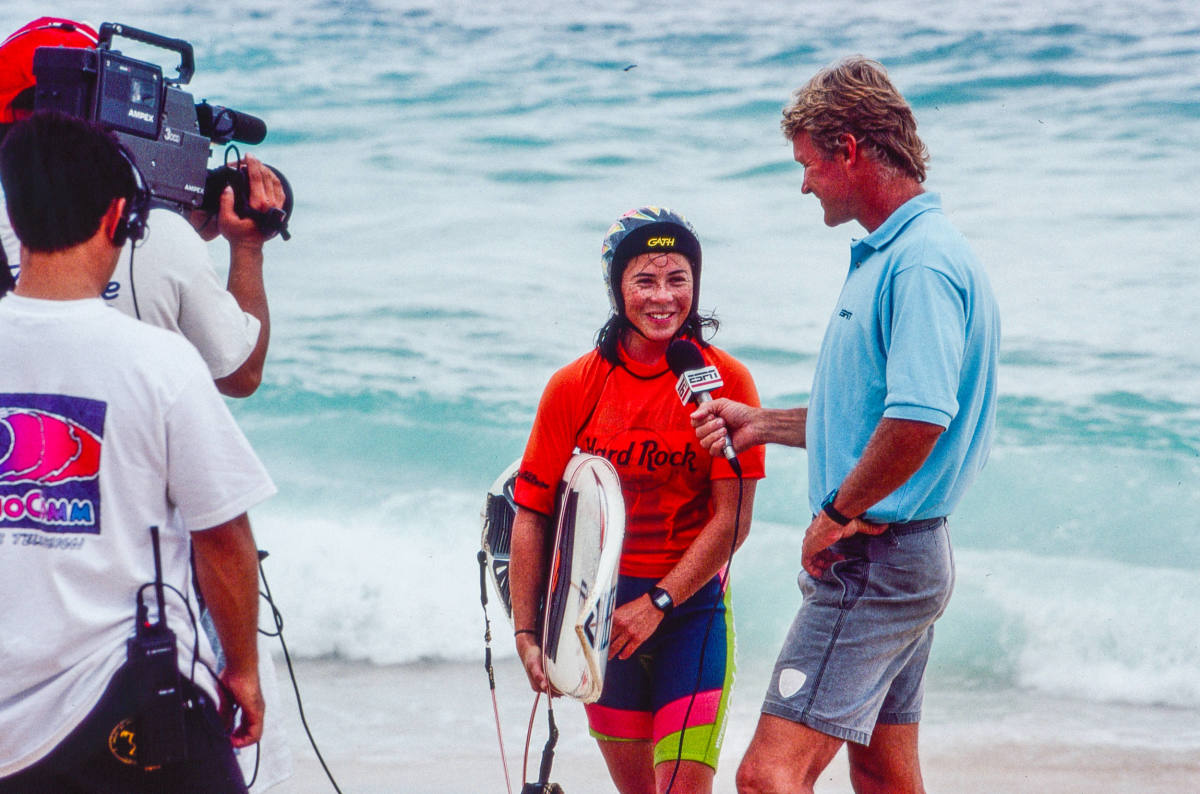
Tom Servais
Why was it important for you to tell your story?
Another big reason why I wanted to do a book is because when I watch the WSL, it’s like they don’t even know anything about us and you don’t even get mentioned. Now they’ll be able to know my whole story. At the moment, you just get left out of a lot of comments – there’s heaps of comments even now like about how the girls are charging but the girls were charging back then as well, they just didn’t have cameras on them. I mean, I remember surfing Sunset huge and just attacking the inside but no one videoed it and so I feel like the WSL has forgotten about the history and tends to just blow it off.
Do you have a favorite anecdote from the book you want to share?
I go into my World Title in depth, it’s pretty cool. I start with a whole story of when I went to Africa, I was in Gabon, I was with my girlfriend and I went to a tribal dance and I got this wood called Iboga, which is a ceremonial hallucinogenic that can help you if you want to stop going astray. After the ceremony, they basically said to me, “whenever you compete, you need to feed a tree what you’re eating and drinking.”
Then when I was going for the World Title, I went to Hawaii and I was in a really bad state. My arthritis was just so bad, I could barely walk. My elbows were stuck, my wrists were stuck, I couldn’t bend them to brush my hair. I was just swimming in the pool every day because I couldn’t surf and I was freaking out because the event was coming up and then my girlfriend at the time said, “right we need to go feed the tree.” So we found the biggest tree on the North Shore and went and fed the tree food and water and then the next day, when I made it to the final, I was already World Champion.
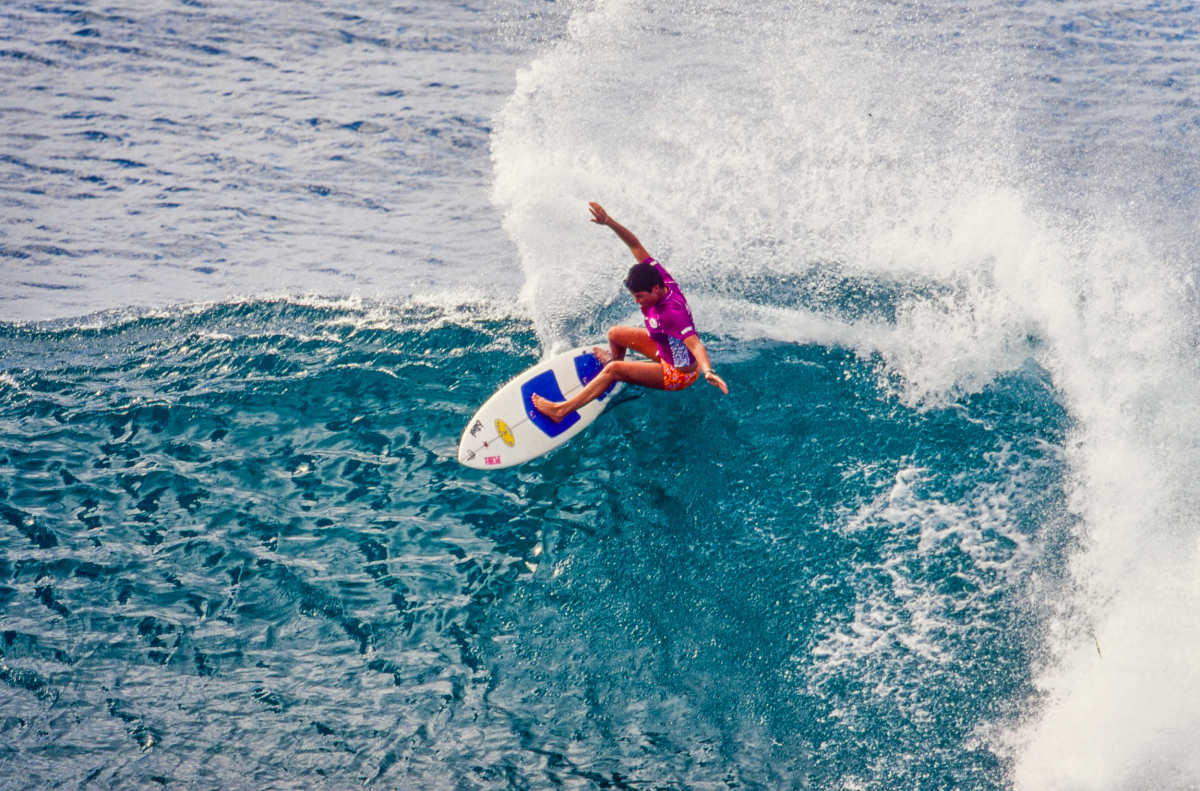
Tom Servais
How did you manage on tour with your arthritis? Did it affect your surfing?
It was a massive struggle, but it would come and go. From the very first year I was on tour, I’d wake up in the morning and I could barely move at all, so I’d get up at 3am and have a bath and I still wouldn’t even be a normal body like everyone else,
For my World Title at Sunset, it was actually scary; I was like a 95 year old, I was so fragile. The way I was walking down the beach, I was walking crooked and I remember my girlfriend Nadege had to put me in the shopping trolley to go shopping and people were yelling at us, “get out of the shopping trolley,” but they had no idea I was using it as my wheelchair. Jodie was staying with me and she’s going, “why aren’t you surfing?” I’m like, “I’m in agony, I cannot surf.” So I didn’t surf at all before the event.
But my drive to win was just insane. I was just never say die, I just went.
Being from Bondi must have contributed to your toughness, what was it like growing up there in the 80s?
Bondi was pretty rough. There were a lot of drugs there, because I remember you could never walk close or ever sit next to the wall down at the beach because that’s where all the needles were. You’d always try to take a big jump to avoid them when you get from the ramp onto the sand.
The hardest thing I would say was being pretty much one of the only girls there. There was a Surf Club called ITN which stands for In The Nude and it was just the craziest bunch of guys, it was mad. I was one of the only girls out there all the time so there’s stuff I heard, you might be sitting behind guys and them talking about them raping a young girl, and just hearing all these crazy horrible stories. Because I look like a little boy they’d just talk away like there was no girl in the water and I was horrified.
And it was tough, people dropping in on you and one guy punched me in the head. Another said, “if you weren’t a girl I’d punch you in the head,” and I said, “if I was a guy I’d punch you,” and so I’d just always give it back.
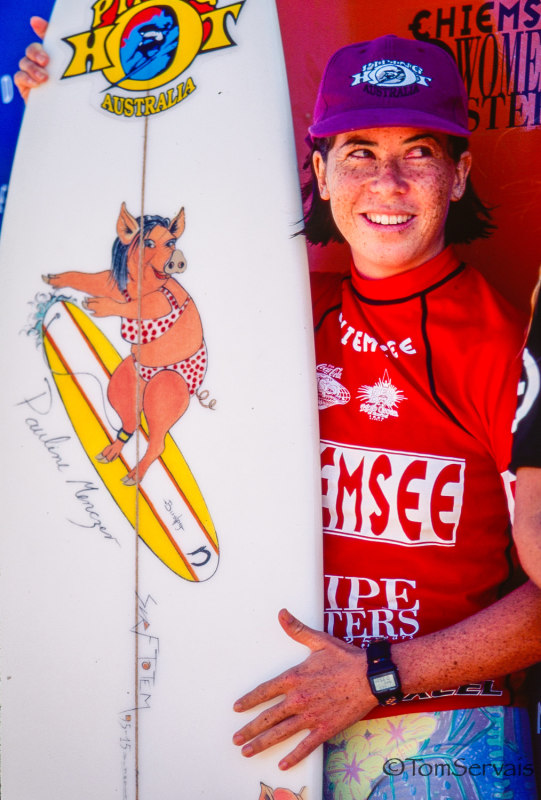
Tom Servais
What’s it been like now getting recognition in Bondi with a statue planned and a mural already there?
When I had the mural painted at Bondi it was incredible because all of the hard times growing up and then when I went back, there’s a lady running the boardriders now and I got picked up and they brought me to the contest, I just felt really special. They’re like “Pauline Menczer is here,” and everyone was quite excited and then all the girls that are in the club all went down together to the mural and got a photo, with a whole heap of girls and then even all the guys as well. Then when I left the beach Victoria, the lady who runs it, announced that I was going and to give me a round of applause. As I was walking up the beach, I was so happy I was teary. I was like, ‘my God, I really do feel like the queen of Bondi.’ Just what a turnaround and just what a journey.
What’s it like seeing all the hype around women’s surfing that’s going on right now?
Pauline: It’s quite funny, I kind of feel like Caitlin [Simmers] is very similar to what I was like. She’s a little freckleface, she’s the same height and she’s got total attitude. My book’s been done for a while and the beginning is about me going to Hawaii for the first time and I am nervous about surfing Pipeline and in the end I get defeated by the boys, they tell me to go in. When Caity said, “Pipeline’s for the fucking girls,” I even asked Jessie Miley Dyer if she can show my paragraph about me surfing Pipe and getting defeated by the guys to the Simmers family in Tahiti. Just because it’s just so similar, it’s just a crack up.
I’m stoked that the book has come out now as well, it’s such perfect timing with everything that’s going on.
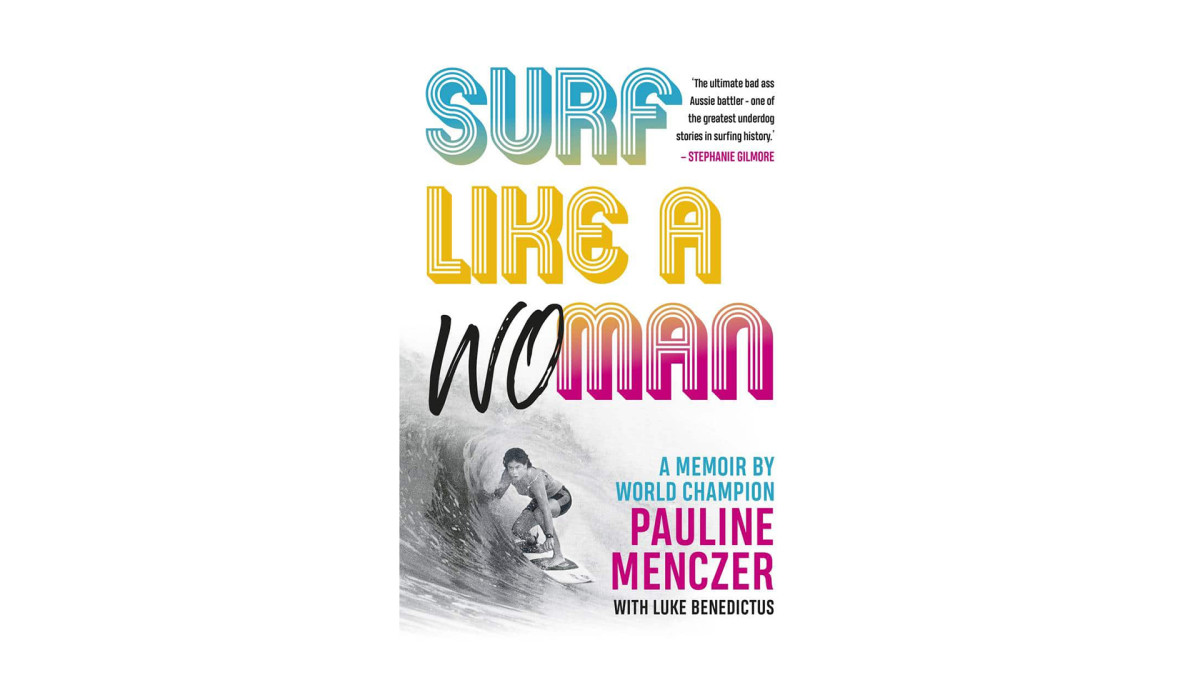
Pauline continues to advocate for better opportunities for women in surfing and is also advocating for improved beach access, raising awareness for the challenges people living with disabilities face with car parks and walkways unfit for wheelchairs, knowing how vital the ocean can be for wellbeing and healing. Her book is available from May 28 in print, audiobook and ebook.

